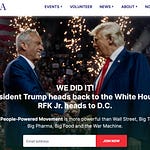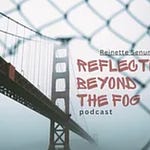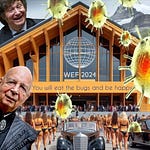I had the recetn privilege of sitting down with Dr. Peter Breggin and, for the first time in a video format, his wife Ginger. Together, they've been at the forefront of psychiatric critique and reform, contributing significantly to our understanding of contemporary healthcare challenges. Dr. Breggin, affectionately dubbed "The Conscience of Psychiatry," has an illustrious career as a psychiatrist, legal expert, and therapist, enriched by his authorship of over 70 scientific publications and more than 20 books. The duo's collaboration on the bestseller "COVID-19 and the Global Predators: We Are the Prey" positions them as vocal humanitarians in today's tumultuous times.
The onset of COVID-19 was a turning point for many, including myself. It was during this time that I discovered the Breggins' critical work on Fear Appeal—a concept that has since become a cornerstone of my discussions, shedding light on the psychological tactics employed during the pandemic. Their insights have been invaluable in understanding how a blend of fear and misinformation could act as a catalyst for widespread societal compliance, especially regarding the contentious debate surrounding COVID-19 vaccinations.
WIKIPEDIA: FEAR APPEAL
Fear appeal is a term used in psychology, sociology and marketing. It generally describes a strategy for motivating people to take a particular action, endorse a particular policy, or buy a particular product, by arousing fear. A well-known example in television advertising was a commercial employing the musical jingle: "Never pick up a stranger, pick up Prestone anti-freeze." This was accompanied by images of shadowy strangers (hitchhikers) who would presumably do one harm if picked up. The commercial's main appeal was not to the positive features of Prestone anti-freeze, but to the fear of what a "strange" brand might do.
A fear appeal is a persuasive message that attempts to arouse fear in order to divert behavior through the threat of impending danger or harm.It presents a risk, presents the vulnerability to the risk, and then may, or may not suggest a form of protective action.
Our conversation ventured beyond the immediate pandemic response to explore the historical and psychological facets of medical interventions, including the tragic tale of Rosemary Kennedy, whose life was irrevocably altered by a lobotomy. We also delved into the Breggin/Robert Malone lawsuit, and the broader implications of governmental and health department strategies, critically assessing the use of fear as a tool of control.
This interview, long-awaited and deeply personal, not only celebrates the Breggins' first joint venture into video interviews but also marks an essential discourse on the interplay between public health, governmental policy, and the psyche of the American public. It's a discussion that, while rooted in the specifics of the COVID-19 pandemic, invites us to reflect on the broader dynamics of trust, fear, and resistance in the face of global crises.
Before I had the opportunity to sit down with the Breggins for an in-depth discussion, they embarked on an audio interview with me that set the stage for our conversation. This initial interview offered a glimpse into their profound insights and the passionate endeavors that have characterized their work. That audio podcast, “Living life to the fullest, finding joy, and practical steps to stop weather manipulation,” can be found on their substack page HERE.
Thank you, Dr. Breggin and Ginger, for your unwavering advocacy and dedication to our collective well-being. Your efforts resonate deeply with all of us who have been touched by your work.
If you find these interviews and articles informative, please become a paid subscriber for under 17¢ a day. I don’t believe in paywalls, but this is how I make a living, so any support is appreciated. Either way…. it’s available to you….













Share this post